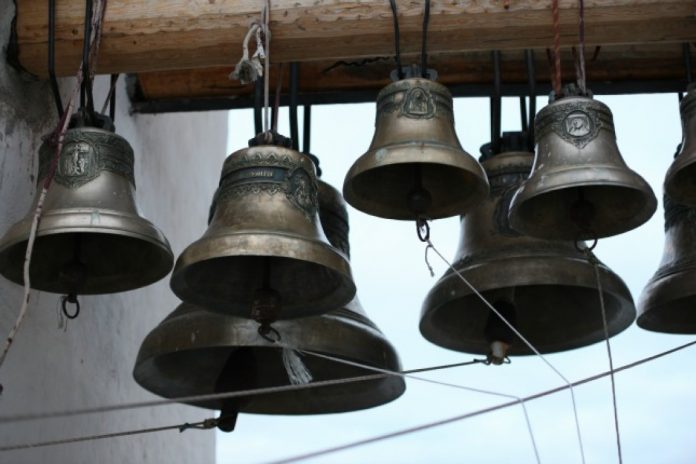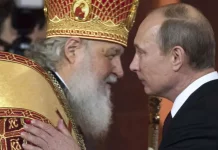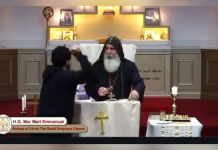Church-bells beyond the stars heard, the soul’s blood,
The land of spices; something understood.
Let’s start with a brief primer on the sonnet. Of the two main forms – Petrarchan/Italian and Shakespearean/English, Herbert follows the latter, that is, three quatrains (abab cdcd efef) and a couplet (gg). Like all great poets, he exercises freedom within the form, e.g., the third quatrain is “e-f-f-e.” More importantly, “Prayer” does not flow but is chopped up into 27 metaphors and many half-lines, some of which are thematically connected, e.g, “heaven in ordinary, man well drest” and others are conundrums, e.g. “reversed thunder, Christ-side-piercing spear.”
The final couplet usually provides a conclusion or moral to the previous stanzas. Yet once again, Herbert plays a trick on us (more on that in tomorrow’s post).
So with that little lesson, let’s return to the penultimate verse and Lennon’s commentary:
So, prayer is said to be like “church bells beyond the stars heard” which at first glance suggests that when the bells of Herbert’s church. St. Andrew’s Bemerton, rang their call to worship the inhabitants of heaven took notice… Well, it would be disappointing to come all that way to be told something so unremarkable….
It is not our church-bells that are heard “beyond the stars,” but heaven’s bells that are heard among us here in our world. Humbling though the thought is for people like ourselves who assume that nothing of worth happens unless we initiate it, the first call to prayer emanates from heaven. Our prayer-bells answer theirs “on earth as it is in heaven.” Our churches are like echo chambers for heavenly praise. The inhabitants of the sphere “beyond the stars” are way ahead of us but they invite us to join them in worshipping the Holy Trinity.
Herbert loved this perspective on prayer as already moving in the universe as we awake each morning [see verse 1: “the church’s banquet, angels age”]. We are never alone when praying; solitary worship is not possible since “you have come to thousands upon thousands of angels in joyful assembly” (Hebrews 12:22), and our every moment is passed in their company. Sing, intercede, give thanks and the great congregation “beyond the stars” open up their adoration to make room for ours. Thus in some of our services the scene is set:
Let us give thanks to the Lord our God…
Therefore with angels and archangels,
And with all the company of heaven
We proclaim your great and glorious name…
The Holy Spirit calls out all heaven for the “further exploration” into God. But in what sense can it be said that the Spirit’s “church-bells” are heard among us in the world? We can believe it because the same Holy Spirit “beyond the stars” also indwells his temple that is our bodies (1 Corinthians 6:19). The one Spirit creates one congregation of all in the universe who worship the Trinity. Spurgeon caught the heaven-on-earth dimension of our present life in his aphorism: “If you have the minimum in the Christian life, it will be enough to get you to heaven; if you have the maximum it will bring heaven to you on earth.” The maximum means we yield to the Spirit who orchestrates cosmic praise, ours on earth with theirs in heaven, taking both as one into Christ’s ceaseless prayer before the Father….
Consider the puzzling juxtaposition of “the Milky Way” in the previous image, with “beyond the stars.” If the stars (the Milky Way) are an image of prayer, what is Herbert hinting at when in the next line he takes us “beyond the stars.” The more I reflect upon this I can only think he is with deliberate design signalling a very different aspect of prayer…. Prayer “beyond the starts” refers to the times of spiritual emptiness and desolation we each of us have known to some extent. Like Job on his ash-heap, the Prodigal in his pigsty, Christ on Holy Saturday. It is an experience not much referred to from the pulpit, perhaps because it runs dead counter to the desires and ideals of our culture….
Not only do those times of spiritual emptiness occur to most of us, it seems they are crucial to growth and progress. God in his love for us deals only in truth and reality when confronting us with our emptiness, our limited powers of understanding, and our perverse ability to confine ourselves in falsehood. Yet even then, especially then, we can hear the Spirit’s voice, his “church-bells” in the darkness. Thus Job survived his ash-heap, Jonah escaped his whale, the wayward son returned to the joy of his father’s home, and Christ rose from the dead.
Prayer is also “the soul’s blood.”
What blood is to the body, prayer is to the soul (“God’s breath in man returning to his birth”). It would be foolish to describe physical blood as an “aspect” of bodily life for that life is inconceivable without it. Blood is the essence of life. Similarly, to call prayer the “soul’s blood” is to claim for it a pervasive power and authority in our personal life as a child of God. The converse is only too apparent, for where prayer is neglected the sense of God’s presence fades, we become spiritually enfeebled, burdened with unconfessed sin and anxieties, joy drains away and the Christian life declines into unreality. Or if we do retain the shape and outline of Christian life it lacks all grip and conviction.
I conclude with this analogy from the current coronavirus pandemic. It was recently reported that some laboratories are testing transfusions of “convalescent plasma” from COVID-19 survivors to current patients, an idea that goes back to the 1918 Spanish flu epidemic. This blood may stimulate antibodies much as vaccinations do. Anyway, suppose we think of the human soul as the victim of our sinful human condition. By faith and in prayer, Christ’s blood received spiritually in prayer and sacramentally in the Eucharist enhances our sick soul to hear the church-bells beyond the stars. Just a thought.










